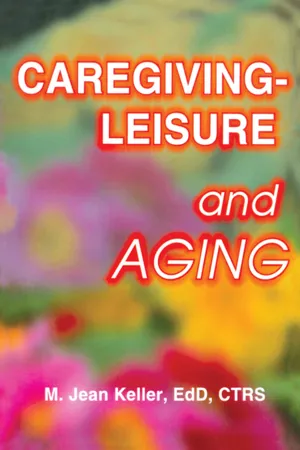
- 104 pages
- English
- ePUB (mobile friendly)
- Available on iOS & Android
Caregiving-Leisure and Aging
About this book
Create programs that make good use of the leisure time of the elderly, and of those who care for them!Caregiving is a vital issue in today's rapidly aging society. Each year, a greater number of elderly people find themselves in need of care, and at the same time, more elderly adults than ever are finding themselves in the caregiving role. Caregiving--Leisure and Aging blends the work of six experts in the field, exploring implications for future practice and research, examining caregivers and care receivers and their need for appropriate leisure and recreation activities, and sharing innovative recreation programs to help caregivers and those in their care enrich the quality of their lives.Here you'll find:
- a review of literature which examines caregivers'health behaviors and discusses sleep improvement, home-based exercise, and several interventions
- the common factors found in successful leisure and activities programs for older adults and those who care for them
- in-depth case studies of three women who cared for their older husbands with dementia and the rationale behind their sacrifice of personal leisure time to provide this care
- a survey of rural and urban caregivers to individuals with Alzheimer's disease
- specific leisure education strategies that have been used successfully in caregiver support groups
- an examination of the innovative Family-based Structural Multisystem In-home Interventions (FSMII) with a Computer Telephone Integration System (CTIS) projectCaregiving--Leisure and Aging provides information and ideas regarding the importance of leisure both to those elderly people receiving care and also to the aging adults who selflessly deliver that care.
Tools to learn more effectively

Saving Books

Keyword Search

Annotating Text

Listen to it instead
Information
Leisure Education with Caregiver Support Groups
INTRODUCTION
CAREGIVING AND LEISURE EDUCATION
Table of contents
- Cover
- Half Title
- Title Page
- Copyright Page
- Table of Contents
- About the Editor
- Preface
- Caregiver Health Behavior: Review, Analysis, and Recommendations for Research
- Recreation Programs for Caregivers of Older Adults: A Review and Analysis of Literature from 1990 to 1998
- Family Obligation, Caregiving, and Loss of Leisure: The Experiences of Three Caregivers
- Rural vs. Urban Caregivers of Older Adults with Probable Alzheimer’s Disease: Perceptions Regarding Daily Living and Recreation Needs
- Leisure Education with Caregiver Support Groups
- Innovative Family and Technological Interventions for Encouraging Leisure Activities in Caregivers of Persons with Alzheimer’s Disease
- Index
Frequently asked questions
- Essential is ideal for learners and professionals who enjoy exploring a wide range of subjects. Access the Essential Library with 800,000+ trusted titles and best-sellers across business, personal growth, and the humanities. Includes unlimited reading time and Standard Read Aloud voice.
- Complete: Perfect for advanced learners and researchers needing full, unrestricted access. Unlock 1.4M+ books across hundreds of subjects, including academic and specialized titles. The Complete Plan also includes advanced features like Premium Read Aloud and Research Assistant.
Please note we cannot support devices running on iOS 13 and Android 7 or earlier. Learn more about using the app